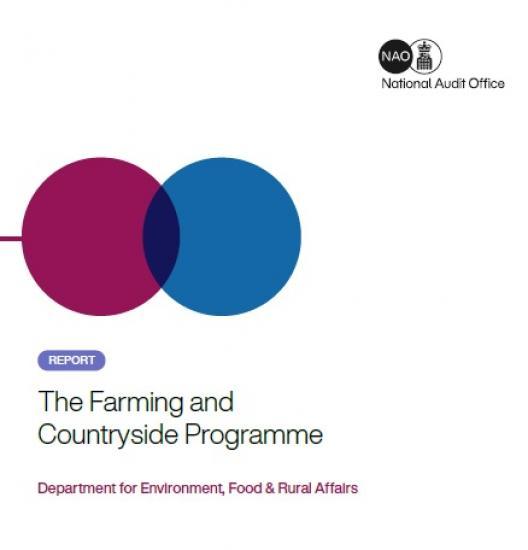The Farming And Countryside Programme - National Audit Office Report
24th July 2024

The report by the National Audit Office relates mainly to England's farming sector but Scotland relies for many agricultural products from south of the border and is therefor of great importance here.
The farming sector is a small but vital part of the UK economy. Despite only accounting for 0.6% (£13.9 billion) of the economy in 2022, the farming sector in the UK produced 62% of the food we ate in 2023. This increases to 75% when only considering food that it is possible to grow in the UK.
Following the UK's decision to leave the EU, the government has been developing a new approach to farming and the countryside in England, describing it as the "biggest change in agricultural policy in half a century". This transformation is taking place at a time when extreme weather, market conditions and world events are combining to put many farm businesses under pressure.
Scope of the report
This is our third report on the Programme. It covers how Defra is:
managing the Programme and addressing key risks
delivering environmental outcomes and food production
seeking to improve farm productivity and maintain a viable farming sector
Conclusions
The Farming and Countryside Programme aims to fundamentally change England's farms. The stakes are high for the environment, food production and the viability of the sector. To achieve the Programme's objectives, many farmers need to transform the way they farm, and Defra's modelling shows the extent of productivity improvements that are needed for farm businesses to maintain viability.
Take-up of schemes is rapidly increasing, but some of what Defra is paying for now are actions that, for many farmers, do not result in significant immediate change to farming practices. Instead, they are expected to encourage farmers to do more for the environment in the long-term.
Defra expects the removal of direct payments to stimulate most of the required productivity improvements. It says it has seen some improvements already as farmers adapt to life without direct payments, but the evidence is inconclusive on whether the scale of change needed will be achieved.
Farmers need quality advice and support to adapt, but Defra has not yet ensured that they can access what they need. Around half of England's farmers say they are not at all positive about their future in farming.
The Programme will continue to change, but Defra has not yet provided a long-term view of how it expects the Programme to develop, for example, in terms of the balance of funding between SFI and more ambitious schemes.
Defra's iterative approach to Programme design makes it difficult for farmers to plan their businesses to remain viable, to continue to produce the food we need and to achieve the Programme's environmental objectives. Currently, gaps in the Programme's data on environmental outcomes is limiting Defra's ability to fully understand the impact on the environment, or whether it is on track to achieve value for money.
Read the full report HERE
Pdf 56 Pages
Read a Summary
Pdf 12 Pages
The report at NAO
